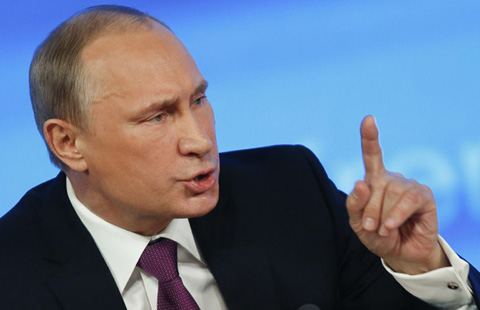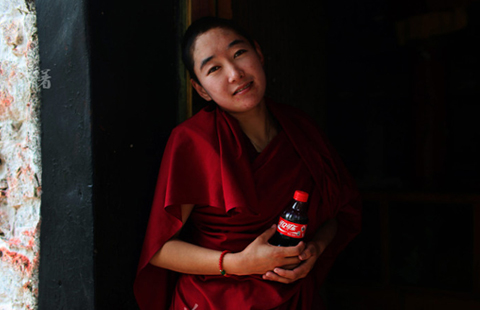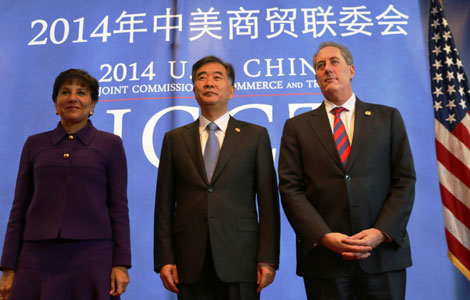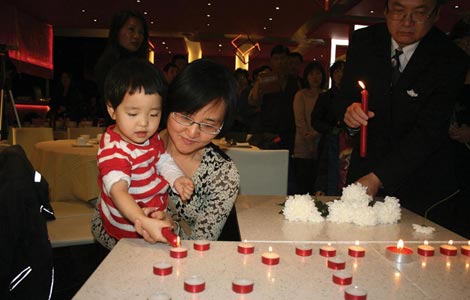A family business on US-China relations
Updated: 2014-09-26 06:32
By CHEN WEIHUA in Washington(China Daily USA)
|
||||||||
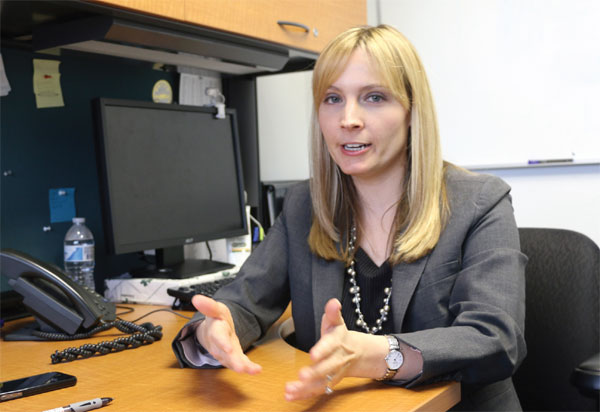 |
|
Melanie Hart, director of China Policy at Center for American Progress in Washington, talks to China Daily in her office on Wednesday. Chen Weihua / China Daily |
Melanie Hart, director of China Policy at the Center for American Progress (CAP), a think tank in Washington, feels mid-career scholars like her see US-China relations somewhat differently compared with the old generation.
"We feel more secure with US-China relationship, and therefore bolder," says Hart, explaining that is probably because she has never seen the relationship completely falls apart.
"I've seen that the ties that bind us are so strong that I feel we can really be honest with one another now," says the 35-year-old, already a specialist in China's policy on innovation, energy, environment and climate change.
Hart sees the difference resulting from the fact that her generation were able to go to the Chinese mainland first. "We didn't study Chinese in Taiwan. We were able to go straight to China (mainland)," she says.
The deep and wonderful friend network Hart has kept in China since her college years means a lot to her. "You know one another when you were completely unimportant, and what you said mattered to no one, so it's a very honest conversation," she says, referring to her contact with those friends in China.
She also believes that in an Internet age, the leaks of everything which include Party documents make it possible for her to get more inside information and it's probably also true for those in China to get inside information on the US side.
Speaking fluent Chinese, Hart thinks it makes a big difference when her generation can talk to each other without interpreters.
Beijing adventure
From Beaumont, an oil town near Houston, Texas, Hart fell in love with China-US relations as an undergraduate of international studies at Texas A&M University.
She says she was then also interested in US Middle East policy, but was aware of the views on women in that geographical area. "I think I will be welcomed in China and treated equally," Hart explains about her decision to focus on studying China.
Unlike today, Texas A&M had no Chinese-language program at that time. So Hart, through the introduction of a Chinese graduate student there, went to study Chinese at the China Foreign Affairs University (CFAU) in Beijing in 2002, shortly after her graduation.
She realized that Texas A&M not having a Chinese program actually provided a great opportunity. "My first deep exposure was directly in China," she says.
While learning the Chinese language from scratch at CFAU, Hart also sat in classes on Chinese foreign policy, learning mostly the Chinese views.
It was less than a year after the collision between US spy plane EP-3 and Chinese fighter jet off China's Hainan Island. Bilateral relations had suffered a setback. But Hart says her experience of being received in Beijing was overwhelming.
"I could see we have something tense happening in the high level, but at the low level, people were amazingly welcoming to me," she says. "The professors were wonderful, the students were wonderful. On the streets, people were happy to see me and happy to talk to me."
Hart knows that Americans are not received that way in every country in this world. "An an individual, my reception in China has been better than my reception in any other place," she says.
Besides Chinese curiosity about foreigners, Hart feels there is more there. "My impression is that people in China feel deep friendship for people in the United States," she recalls her experience in China as a student.
Hart believes this also means there is a huge amount of opportunities for cooperation and deep ties regardless of what's happening at the top level.
During her stay in Beijing in 2002, Hart also witnessed the major Party Congress in which President Hu Jintao assumed leadership.
Eye-opening
After enjoying a fruitful year in Beijing, Hart found an internship at the Scowcroft Group in Washington in 2003. It was her first real experience in Washington.
Once a week, Hart was excited to see General Brent Scowcroft, who was twice the US National Security Advisor under Presidents Gerald Ford and George H. W. Bush, in a meeting and asked him various foreign policy questions.
That year, the US invaded Iraq, and Scowcroft was a critic of US foreign policy. Hart says she was deeply impressed by Scowcroft's conviction in the best interest of the nation even when it's against the White House.
"To me, that was just amazing. There were people like this in Washington," she says.
"That was an eye-opening experience to me."
Mentor guidance
Hart started to pursue a PhD in political science at the University of California, San Diego, but she said she had made up her mind to come back to Washington to do policy work after that wonderful experience at the Scowcroft Group.
Hart was lucky. Susan Shirk, her adviser and mentor at UC San Diego, is an expert on Chinese politics and served as deputy assistant secretary of state for East Asian and Pacific affairs during the Clinton administration.
Hart describes Shirk as a "very hands-on mentor who pays a lot of attention to her PhD students, really guides them and pushes them very hard too to make sure they do good work."
"That was really wonderful," she says.
While studying Chinese politics and international relations, Hart found an opportunity, through the introduction of General Scowcroft, to work with the China team at the San Diego-headquartered Qualcomm, a US semiconductor company that was trying to penetrate the Chinese wireless telecommunications market. While her work was mostly in San Diego, she also spent a summer in Qualcomm's Beijing office.
Hart felt lucky again. On the one hand, she was pursuing her PhD program to study China-US relations in an academic way. On the other hand, she was able to work with a global company to work on their China market strategy and to see first-hand how these companies do business in China, what the challenges they face and then come up with good market strategies.
China policy work
After finishing her PhD in 2010, Hart was recruited by Peter Cowhey, who served on her dissertation committee, to the Aspen Institute in Washington in 2010, working on a new set of global trade rules for information technology.
Hart left Aspen a year later to join the CAP, where she focuses on US-China energy and climate and environment relationship. To Hart, it was somewhat a continuation of her previous work at Aspen because China has the same innovation policy for information technology and green technology.
She acknowledges that there was a lot of concern about the US competitiveness at that time, so CAP chose to bring in someone who knew China's innovation policy.
She sees climate and energy to be the biggest opportunities for the US and China to have deep and broad cooperation.
With the UN climate summit in New York this week, Hart hopes US President Barack Obama and Chinese President Xi Jinping will make another announcement on energy and climate when they meet in Beijing in November. The two had made related announcements in their previous meetings.
Regional gap
With pollution in China getting worse, Hart has seen the growing public pressure for action there. She says the central leadership has responded by rolling out a new air pollution program for the eastern seaboard. "I studied the policy program in great detail. They are very ambitious," she says. "What they have done so far is impressive. As foreign observers, we have to acknowledge the fact. A lot has been done domestically in China."
As a China scholar, Hart understands well why China is adopting different policies for different regions where economic structures are starkly different. "You cannot apply the same policy in Guangzhou as you want for central China. That's exactly like in the US, California and Texas have very different environmental policy," she says.
Though the regional approach may work best for big nations, Hart expresses her concern over the migration of coal plants and dirty industries from eastern China to western China.
She says that if the Chinese government can follow the amazing program in the east to come up with an amazing program for western China. "Then we have to acknowledge China is doing a great job."
She points out that a major obstacle for American companies to apply their cutting-edge technologies to China has been the weak protection of intellectual property rights.
"I have met US companies which have really great clean energy technologies, they really would love to have the China market as their first market for deployment because China is a big market and it's the best place to go," she says. "But they are so afraid of the IPR situation there they cannot do it."
Hart describes it as a very sad decision for those US companies, implying that it's sad for China too.
Broader study
With her new title as director of China policy at CAP, Hart has moved from the energy team to the national security team at CAP. She still pays the most attention on energy and climate change, but she has to broaden her study to even include the latest fight against Islamic State.
And she has certainly broadened her view at home where her husband, Yi Edward Yang, now teaches Chinese politics at the James Madison University in Virginia. The two first met at Texas A&M when Yang introduced Hart to the language program at CFAU where he graduated as an undergraduate.
Hart describes her husband's work on US-China relations as more academic and in a long-term way, such as analyzing US leaders and how their personal differences impacted their approach to China.
"So we have a family business on US-China relations," says Hart, a mother of a 9-month-old boy.
chenweihua@chinadailyusa.com
Most Viewed
Editor's Picks
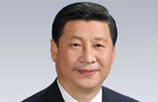
|

|

|
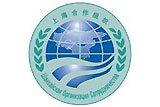
|
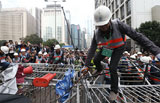
|
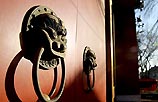
|
Today's Top News
China OKs modified corn imports
California city fights 'birth tourism'
Build, not break, a bridge for people
Chinese city shops for talent in Houston
Cleaner coal goal in deal by Houston firm
China, US get things done at trade talks
China niche for California design firm
NYC schools can mark Lunar New Year
US Weekly

|

|
